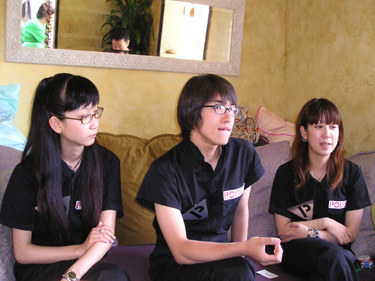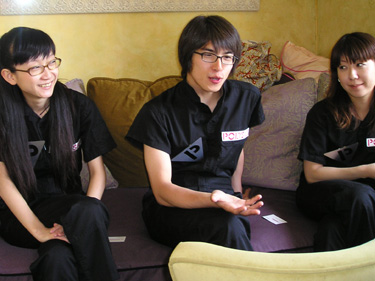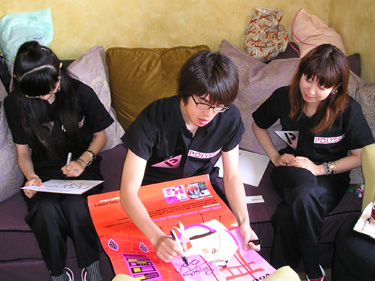
|
Sunset Blvd. Street address of such clubs such as the Whiskey A -GO GO, The Roxy and clubs where legends like Jim Morrison, the Doors and KoRn watched their careers flourish. I, a huge fan of fresh and odd music, went to the Grafton Hotel to get an in depth interview with the band behind the " P ". Having come off the recent Pop Japan Travel trip, I had a good idea what the current music scene was in Japan, and now it was time to dive into the minds of those that would not normally have these kind of questions asked. When I first arrived, Hayashi (lead singer, guitar) immediately recognized me from the night before and cracked a warm smile as I could assume he was reflecting upon his newfound American audience. The other band members, Kayo (voice synthesizer, keyboard), the stiff and quiet one that surrounds herself in electronics a la "Serial Experiments Lain" and Fumi (bass) whom just came back from a little bit of good 'O sunset shopping soon joined us. They all ordered ice teas, and I got a Coke. I briefly complimented the group on their great sense of fashion appeal. Kayo, suggested the red shoes they were rocking would look great with my hair. I knew these electric cats were on a different plane. With a few suit and tie Japanese interviewers waiting for their turn behind me, I knew Akadot would give'm an interview slighty "a tip from the norm." Akadot: Where do you get your inspiration? What kind of music or musical artists inspires you, either Japanese or Western? Fumi: For the American groups, I get inspiration from groups such as The Ramones and B-52's. For Japanese music, I listen to Group Sounds, which is like a British 60's type of band and my friend's band, Number Girl. Hayashi: I first started to listen to rock music. Now, I listen to different styles of punk bands, Western or Japanese. When I feel like making music, then I would get my guitar and start playing. Kayo: When I was really young, the only popular music I really listened to was the music featured on television. I really didn't know much about the music scene until I joined Polysics. And then I started learning about music that Hayashi gave me such as Devo and other new wave. Right now I get my inspiration from listening to piano music since I play piano.
Akadot: Each of you have a certain on-stage appearance or style of performance. Hayashi, you convulse on stage like you're being electrocuted and Kayo you present a stiff and robotic sense of playing. Do you think you are like this off stage or is the stage a place where you can be yourself? Hayashi: We're really not like that when we are off stage, but I don't really know if we are really ourselves or not on stage. When I'm on stage, I feel like I've been "switched on" or on fire. Kayo: In my early days of performing on stage, I was always tense. But the reaction from the audience was really good that I was quiet and stood still when playing the piano. So when you watch us on stage, you see a good contrast of Hayashi being very active and with me being very quiet. Akadot: You usually wear jump suits when you perform. Who came up with the idea and designs your costumes? Fumi: The original concept was to be similar to Devo and we actually wanted to wear something typical of Devo. But when we chose our costumes, everyone has their say, including the recording company when drawing up the idea and what changes should be made. Akadot: You seem to describe your style of music in Japan as "new wave." However, in America, "new wave" is sometimes used to describe serene, laid back or "ocean" music. Does the term differ when used in Japan? Hayashi: In the mid-70's, punk music came on the scene and there was a lot of followers and at that time, punk became the standard music of the scene. And then came rock, a new type of music, which was more like western rock and punk rock, which was categorized as new wave. But within new wave, the artists are different. It's not so much as a music genre, but about who is making more stimulating music. The " new wave" that will catch your ear!
Akadot: Is this your first time and tour in America? What made you decide to come out here and what do you think about American audiences? HY: This is the second time in America. The American audiences are great. It is nice to know that we have a fan base out here and people listen to our music. The audiences are somewhat different in America. But what makes the audiences similar is that they all feel the same musical vibe. Akadot: Since your style of music is different from what most Americans know about Japanese music, what are your opinions of Jpop? Hayashi: Traditional Jpop music and our style of music are in a different zone. I don't really consider myself with that style. I usually focus much of my time on the new wave punk scene. Akadot: What would you like to do while you are in Los Angeles? Polysics: We would really like to research more music shops and buy records while we are here. Akadot: Have you gotten a chance to check out any of sunset famous clubs? Hayashi: Not yet. Akadot: Really something tells me that you'd really enjoy seeing the Whiskey and the Troubador. Lot's of new and famous bands have played the Sunset and Holywood scene. Sonny & Cher, Marvin Gaye, Metallica, Korn, System of a Down. Hayashi: (Eyes light up) Really! Wow, we've got to see this. Akadot: So you've tour Japan, you doing America w/ an upcoming English album, What's next for the Polysics? What is your ultimate music goal? Hayashi: To save the Japanese music industry, with our new sound. Then after that, America.
Now that you've read the interview, enter to win a Polysics autographed poster here in our Polysics Will Save the World contest!
Haven't heard the sounds of Polysics? Get your Japan for Sale Volume 3 CD featuring Polysics here from Akadot Retail.
|
|||||||||||
|
Japan for Sale Vol. 3 and Polysics © Sony Music International, Inc.
|



